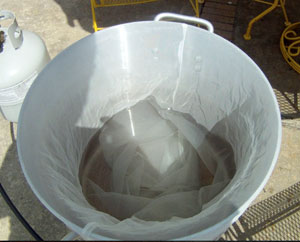If you went through corporate training in the 1990s or saw the demonstration reel for the Video Toaster, you’re familiar with the term “paradigm shift.” Brew in a bag (BIAB) is a paradigm shift for all-grain homebrewing — a new way of thinking that is a break from the past.
Traditional thinking for all-grain brewing says you need three vessels: one to use as a hot liquor tank for heating water, another to use as a mash tun where wort (unfermented beer) is created, and a third where the wort is boiled and hops are added. BIAB calls for just one vessel – your brew kettle, where all of the above functions will happen. [Read more…]










Recent Comments